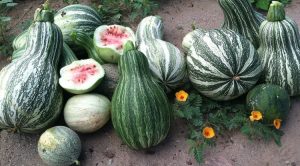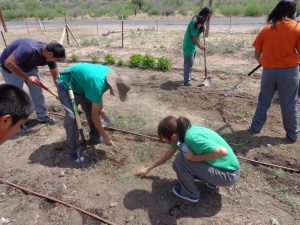Located about 100 miles east of Phoenix, the San Carlos Apache Reservation consists of 1.8 million acres, the majority of which is forest lands and range lands used for grazing cattle.
Activities
The goal of the San Carlos Apache FRTEP extension program is to help youth on the Reservation develop positive skills, aspirations, attitudes and behaviors through programs in gardening, nutrition, 4-H, range management and livestock. Agents are working with young people to help instill such life skills as responsibility, generosity, and entrepreneurship by involving them in raising their own food in traditional Apache and conventional gardening, and in preschool programs in nutrition, gardening, physical activity and early literacy.

Highlights
MEASURING IMPACT
-
“[Agent] is our consultant, our expert. He’s the boots on the ground doing archery, equine, gardening, nutrition, all these things that directly work with youth.”
-
“Another ripple effect has been working with the restocking programs, spending economic development money back into the livestock industry. Some of the science behind that with University employees, we’re doing genetic improvement, artificial insemination. The actual restocking plans themselves had a lot [University] review that gave merit to get funding, to get the tribe to invest several million dollars into some of the process.”
FRTEP programs have had a major impact on individuals, families and tribal communities. Just how much impact has now been quantified thanks to a research project that used Ripple Effects Mapping (REM) and content analysis. The Indian Land Tenure Foundation (ILTF) engaged in a joint collaboration with an evaluation team and the Western Extension Risk Management Education Center to measure the long-term impacts of the Federally Recognized Tribal Extension Program (FRTEP) serving the San Carlos Apache Reservation. Click the link below to read the report.
4-H Youth Development
Extension agents at San Carlos use both a hands-on and classroom approach involving artistic and applied science methods to motivate young people to adopt positive attitudes about growing their own food, raising their own animals, learning archery and arts and crafts, and acquiring the traditional Apache culture connected with these activities.
The San Carlos 4-H Program serves youth on the reservation, with traditional 4-H clubs, collaboration with community agencies, and school enrichment programs. Club programs include arts and crafts, archery and hunting, gardening, horse and steer. An average of 30 youth participate each year. The 4-H program has collaborated with Boys and Girls Club and Diabetes Prevention to provide nutritional training for staff, and family fun night nutrition and exercise programs. San Carlos 4-H has also participated in the Natural Resource Practicum, a summer camp designed to introduce high school students to natural resource careers. School enrichment activities include a GIS/GPS computerized mapping course at San Carlos High School and Character Education at St. Charles Catholic School (K-6), taught in cooperation with teachers and administrators at these schools.
Youth Gardening
Extension works with youth to learn about gardening activities in order to produce crops utilizing their own land. Youth learn about plant needs, plant parts, soil types, seed saving, planting season, water preservation, composting/worms and physical activity. In addition 4-H members and parents participated in community activities related to growing food on their land to provide for family and community members in need. Extension also works with kids at early childhood centers to help them learn about fruits and vegetables and the importance of physical activity, healthy eating, literacy and agriculture.
Agriculture and Natural Resources
San Carlos Extension works to connect tribal members to available agricultural resources. These include workshops to promote understanding and application of financial principles and record-keeping practices in cattle production, ranch and range management. Extension also works with horse trainers, tribal ranch personnel and community members in order to decrease the potential exposure of the tribal horse population to disease and increase their immunity and resistance.
Additional activities include a Master Gardener program and workshops focused on solar, rural business, crop growing and gardening, beef quality, and emergency planning.
COVID-19 Activities
- In collaboration with a non-profit organization, agents distributed 600 pounds of vegetables to community members that was donated by farmers.
- Assisted with COVID-19 relief packages for community members.
- Assisted in the delivery of packages that included nonperishable items such as dry food cans, essential soap and other hygiene items.
- Provided soap, latex gloves and hand sanitizer to community members in collaboration with non-profit partners.
- Assisted partners in setting up Zoom meetings for cattle associations and partners.
- Consulted horticulture activities for schools, the health department and non-profit organizations to preserve available gardens and plant new ones.
- Provided informational flyers with a list of resources for community members on “what to plant and how.”
- Partnered with a non-profit organization to deliver gardening items to 100 children that included seeds, pot, soil and instructions in a ‘Summer Fun Pack.’
- Provided garden packages for 4-H families to plant at home and learn about horticulture.
- Assisted in delivering a webinar on how to apply for assistance funds.
- Provided Zoom classes for the detention center on youth gardening.
- Assisted local farmers with garden demonstrations, planting, and continuing education.

Contact Information
Juan Arias – Extension Educator
Phone Number
928-475-2350
jarias@cals.arizona.edu